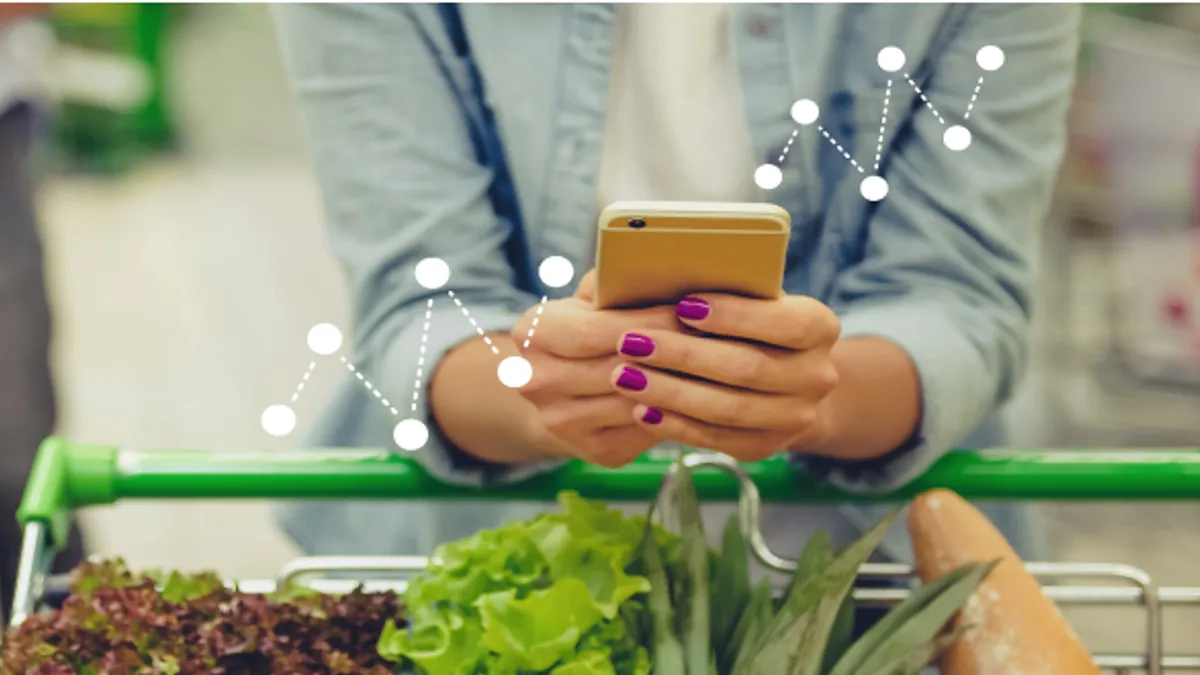-
The need for social distancing is accelerating the trend toward more convenient, digitally enabled, "frictionless" shopping.
-
Innovators are turning to RFID for better customer experiences, vastly improved inventory management, and more.
-
Dirty Lemon, Sodexo, and Esselunga are among the companies defining friction-free convenience.
For some time, convenience has been the prevailing trend in the grocery industry. Writing in Forbes in February, analyst Natalie Berg summed it up nicely: "In retailing today, you have to save time or enhance it."
That's even more true now that the industry is contending with another c‑word: COVID-19. Before the outbreak, Internet-conditioned consumers wanted shopping to be "frictionless"— faster, easier, and light on unnecessary interaction. Now, faced with the need to socially distance, they want those things even more—and right now, please.
The pre-pandemic move towards convenience was driven, logically enough, by convenience stores, which have cannily evolved to become "food forward," matching larger grocers' offerings of fresh, high-quality items, but still selling them in smaller neighborhood spaces where you can more easily grab what you need and go.
Consumers are voting for this approach with their wallets: In-store sales at U.S. convenience stores increased by nearly 9% in 2018; in China, they jumped 19%. More than a third of brick-and-mortar retail space is now composed of convenience stores, and spending in the segment worldwide is expected to exceed $48 billion by 2024.
Seeing this writing on the wall, grocers in general have been investing in technology that makes shopping easier. But convenience stores remain on the leading edge. AmazonGo has become emblematic of the effort, but other brands are innovating as well. 7-Eleven has launched a contactless delivery service and is piloting a scan and go concept.
In Japan, no less than Ministry of Economy, Trade and Industry has asked convenience stores to implement automation to cope with a labor shortage and make shopping more pleasurable.
Now the emergence of COVID-19 is adding urgency to this push for a friction-free experience and putting more pressure on grocers to automate their supply chains
Some of the most promising inroads are being made by convenience-oriented retailers deploying solutions based on radio frequency identification, or RFID, which can enable not only friction-free, socially distanced shopping, but enormous back-end efficiencies as well. At Avery Dennison, we're excited to be helping to shape these digital transformations, which point the way to the future of grocery shopping and food service.
For example, customers of Iris Nova's cashierless Drug Store in New York's Tribeca neighborhood can walk in, grab their favorite Dirty Lemon beverage from a refrigerator, tell the company what they took via text, and be on their way. That's it. Payment is debited from their account, and Iris Nova's system logs the inventory change.
The secret is a small Avery Dennison RFID tag on every bottle, which creates the bottle's digital twin in Iris Nova's inventory system. Besides validating sales, the tags enable better stock management and at-a-glance knowledge of where any item is in the supply chain. They also enable automated monitoring of expiry, more accurate sales data, and mobile-based experiences that let customers take part in promotions, explore how their beverage was made, and discover other Dirty Lemon products.
While COVID-19 has forced Iris Nova to pause its brick-and-mortar operations and focus on its direct-to-consumer business, the company still plans to install its RFID-enabled refrigerators in other retailers' stores and in non-retail spaces like gyms.
"With RFID technology as a foundation, we have a lot of potential to make frictionless shopping a reality and engage even further with our customers," says Zak Normadin, the company's CEO.
Sodexo, one of the world's largest food service corporations, has also successfully deployed RFID through SmartChef™, a grab-and-go vending concept based on CryoWerx's SmartFridge. SmartChef centers on a SmartFridge stocked with entrees, snacks, and beverages. Each item is tagged with an Avery Dennison WaveSafeTM RFID label, which allows heatable items to be safely microwaved and every item to be tracked in Sodexo's inventory. Using the SmartChef app, consumers unlock the fridge with a QR code, choose an item, and are billed automatically. Based in part on Sodexo's success, "Our sole focus now is expanding and accelerating the use of SmartFridge globally," says CryoWerx CEO Darwin Gosal.
In central Milan, "semplice, vicino, fresco"—simple, close, and fresh—is the brand promise of La Esse, a small, hip neighborhood market opened by leading Italian grocer Esselunga. Every item in the store is tagged with RFID labels, which are applied along with pricing labels. Customers pay by inserting their shopping bag into compartments on one of four "Presto Cassa" checkout stations; the system reads the RFID tags and instantly calculates the total cost, no cashier necessary. The store also offers "Clicca e vai" (click and go) lockers for patrons who want to order online and pick up their groceries at the store. Early response to La Esse, driven in part by COVID-19 concerns, has been strong.
The move to frictionless convenience was well in play before COVID-19. Now the outbreak has raised the stakes. As more brands are discovering, RFID can be a powerful, cost-effective, and easily deployable addition to any grocer’s digital strategy—during the pandemic, and well beyond.
To learn more Download The Future of Frictionless Food, a free report on RFID in the grocery industry. Or reach Avery Dennison's team of experts here.
Julie Vargas is Avery Dennison Intelligent Labels global director of RFID market development for food.






